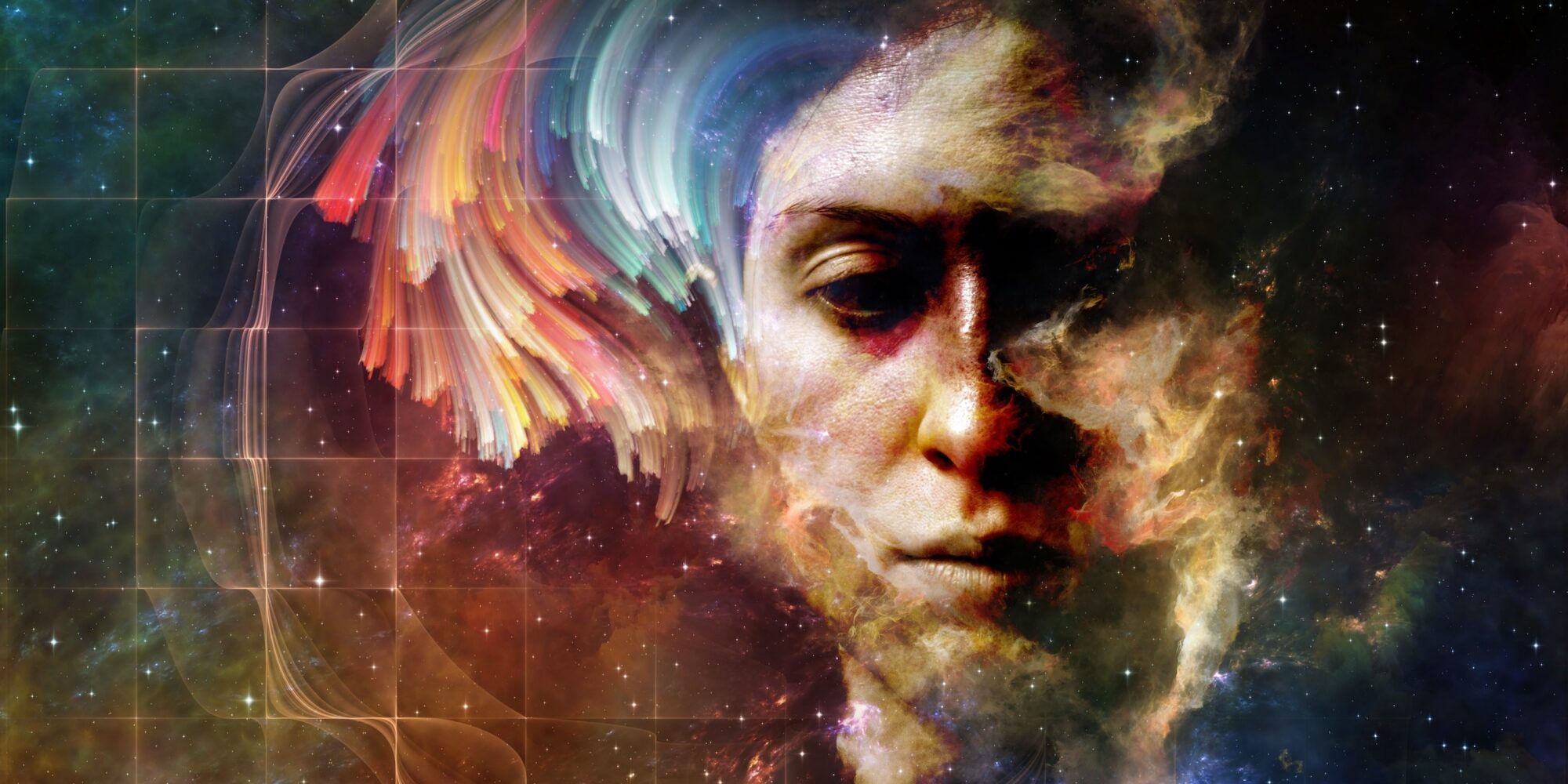All matter is a cognitive ‘hallucination,’ even the brain itself
Reading | Neuroscience
![]() Aditya Prasad | 2024-06-23
Aditya Prasad | 2024-06-23

Neuroscience has conceded that the same cognitive structures that generate dreams also generate our experience of waking reality. It’s just that, unlike in the former case, in the latter the ‘hallucination’ is modulated by external factors. Be that as it may, the implication is still that all we colloquially refer to as ‘matter’ is a cognitive construct of our minds. However, as Aditya Prasad highlights, despite such acknowledgment most neuroscientists still surreptitiously seem to assume that the chunk of matter we call a ‘brain’ is special: unlike all other matter, which is ‘hallucinated,’ the brain is the thing that generates the hallucinations. But for the account to remain consistent, we must understand that the brain, too, as a material object, is part of the hallucination. The implications of this consistency, Mr. Prasad argues, are ineffable.
We hallucinate our perceived realities. If you haven’t encountered this idea before, then I encourage you to watch this TED talk by neuroscientist Anil Seth (titled “Your brain hallucinates your conscious reality”). Beneath the video you will find numerous highly-upvoted comments along these lines:
Ah yes watching this during an existential crisis in the middle of the night was a great idea.
and:
That’s the type of title that causes an existential crisis in my mind before I even click on the video.
Yet, typically, shortly after making such comments, people go right back to living their lives as though everything were completely normal and their worlds, as experienced, were external to them. Why? Because our minds won’t easily let us internalize this knowledge deeply enough for us to see its full implications; to ‘peek behind the curtain,’ as it were. Indeed, Dr. Seth himself has apparently not done so. How do I know?
Because once you experience the trick firsthand, you see that even brains are hallucinated constructs—and therefore cannot be the actual things doing the hallucinating. Afterward, you would make sure to title your talk ‘Your mind hallucinates your conscious reality,’ so as not to reinforce the mistaken notion that brain = mind. That equality is itself part of the hallucination—perhaps its most fundamental trick.
The title of the talk (as well as its content) induces a ‘trippy’ feeling in viewers, only to quench it by reassuring them that at the basis of the illusion is something solid and familiar: good ol’ brains. But what are brains, if not physical structures made of the very stuff whose existence was just called into question? In this way, the rug that was yanked out from under our feet is very neatly placed back there, almost without our noticing.
Dr. Seth would no doubt contest these claims. Surely it doesn’t matter whether you’ve seen ‘behind the curtain’ firsthand, or merely understood the process intellectually. In both cases, your objective knowledge is the same. If such an experience were to radically alter your worldview, we should chalk it up to your (very real) brain tricking you into doing so. Therefore, why bother to experience it firsthand?
This question—namely, why bother?—is precisely how your mind tricks you into never ‘peering behind the curtain.’ There is something that it does not want you to see. After all, it is generating this hallucination for a reason.
The truth is that most of us have never actually looked our experience fully in the face before. There is an astonishing miracle unfolding before (or more accurately, within) us in every moment, whose glory is impossibly beyond measure. Yet we somehow never notice it. To borrow a line from the Bible: “You cannot see My face; for no man shall see My face, and live.” I do not believe this line is alluding to physical death, but instead to a process that psychonauts sometimes refer to as ego death. It is impossible to perceive the infinite glory of Reality and still maintain the illusion of being a separate self lost in a fundamentally external reality. It is only to preserve our egoic structure that our minds make us perceive a mundane, intrinsically lifeless physical reality.
Elsewhere, the nature of God is said to be that of an uncreated light. In what sense is it ‘uncreated’? The infinite Light of which your reality is made actually precedes your notions of time and causality. It is possible to directly experience this fact just prior to your mind constructing a model of how your reality came about, what it is for, etc.; prior to any notion of creation and destruction. Such a perception is often described as timeless.
Until we see this clearly, we are always subtly looking away from our direct experience, by feeding ourselves clever stories about how we already know what it is and how it came to be, thereby convincing ourselves that we don’t really have to look. Meditation is nothing more than the practice of undoing these stories, culminating in a moment of looking directly at what has always been right under our very noses without our noticing it. It is described as en-light-ening for a reason.
But why should such a perception alter your worldview? And why would you take it seriously even if it did? This is the hardest thing to communicate—and I believe it is the root cause of the endless debates in which materialists and idealists continually talk past each other.
At the heart of such metaphysical debates is, of course, the question of what is real. They seem to be about which of two things (consciousness or matter) is more real, but they’re actually about what the word ‘real’ ought to refer to in the first place.
If you have not directly experienced the fact that your reality is a hallucination, then you can still harbor the illusion that your model of reality is grounded in something solid and dependable: that it points to reality. But if you have had the experience of entering your perception prior to the point that your hallucination of reality has fully formed—and, crucially, you had enough presence of mind to clearly see what was going on in there—you will have discovered firsthand that your model of reality has no such solid basis.
That it has no such basis isn’t a controversial point, even amongst materialists. To quote arch-materialist Sean Carroll: “We have every right to give high credence to views of the world that are productive and fruitful, in preference to those that would leave us paralyzed with ennui.” In the context of his writing, he is explaining why we should trust materialism even though it is (in a very precise sense) no more likely to be true than competing hypotheses. Namely: since it is logically impossible to prove any model of reality correct (or even to put accurate probabilities on them, absent external information that is by definition inaccessible), we are free to pick what we consider real.
It is possible to maintain this position right up until the point when you look your experience fully in the face for the first time. In that moment, you finally realize how comically absurd it is to use the word ‘real’ to refer to something that you have literally no reason to believe in. You were only doing so to maintain a particular illusion; to hide something from yourself. In a flash, that word—namely, ‘real’—gets repurposed to refer to that-which-is-completely-unmistakable—the only thing that word could possibly deserve to mean.
Reality is that which, when you stop believing in it, doesn’t go away.
Philip K. Dick
It is impossible to put too fine a point on this. If it is unclear what I mean when I say that you have “literally no reason to believe in” physical reality, please read this piece. I mean it in a precise sense; one that philosophers (materialists included) have already fully conceded. Yet it is not enough to understand this fact intellectually, because there is a deep aspect of your mind that will still sneakily hide its full import from you. It is protecting your egoic structure (for which you should thank it).
For the same reason, it might be difficult to see what I’m pointing to when I reference “this-which-is-completely-unmistakable.” It is literally the only thing you have ever encountered (or ever could encounter) and yet our minds reduce it to just another thing; no big deal. This reduction will continue to occur until the rug is firmly pulled out from under your reality for long enough to see what remains. Only at this point are you forced to confront the infinite splendor that never began and never lets up—that which properly deserves the exalted designation ‘real.’
For this reason, these two groups—those who have fully penetrated the illusion (even once) and those who have not—are fated to talk past each other. It is inevitable; a tragicomic joke that Reality plays on us (or really, that we play on ourselves). Luckily, it is possible to transition from one group to the other—but be forewarned: that transition is a one-way street.

Essentia Foundation communicates, in an accessible but rigorous manner, the latest results in science and philosophy that point to the mental nature of reality. We are committed to strict, academic-level curation of the material we publish.
Recently published
Reading
Essays
Seeing
Videos
Let us build the future of our culture together
Essentia Foundation is a registered non-profit committed to making its content as accessible as possible. Therefore, we depend on contributions from people like you to continue to do our work. There are many ways to contribute.















